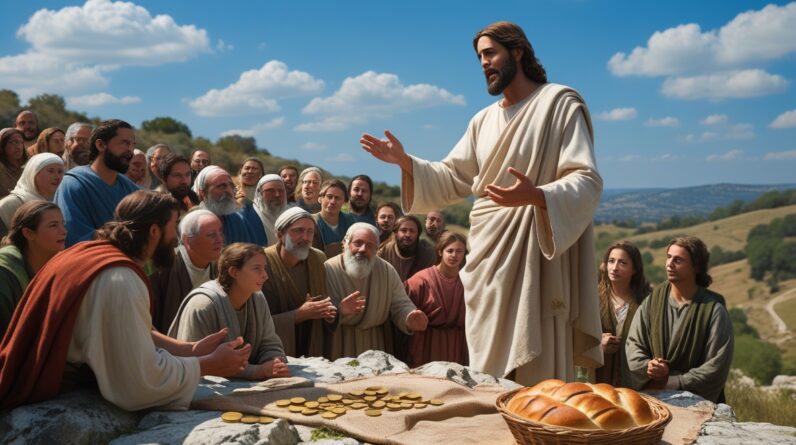Generosity That Transforms: Giving Beyond The Tithe
You already know that giving is part of the Christian life, but you might not realize how transformative generosity can be when it moves beyond the mechanical act of tithing. This article walks you through why generosity matters, how the Bible frames giving, and practical ways you can live a life of abundance that blesses others and deepens your faith. As you read, you’ll discover how generosity becomes a spiritual discipline that reshapes your priorities, relationships, and impact in the world. You’ll also see biblical examples and practical steps to cultivate a life where generosity is not an obligation but a joy. In short, this is about generosity that transforms your life—and the lives of those around you.
Why focus on giving beyond the tithe?
You may have grown up hearing that tithing—giving 10%—is the gold standard for Christian giving. Tithing is a good starting point, and you can find clear teaching about it in Scripture. For instance, Malachi highlights the call to bring the whole tithe to the storehouse so God’s work can be sustained (Malachi 3:10). But the New Testament pulls you further into the heart behind giving: it’s less about legal compliance and more about how God shapes your heart. When you move beyond the tithe, you begin to experience generosity as a spiritual posture—one that reflects the gospel and demonstrates God’s grace to a needy world. This is a major theme when you study generosity in the Bible.
The heart behind generous giving
When you read the New Testament, you notice a frequent emphasis on the heart. God cares much more about why you give than how much you give. Paul taught the Corinthians that God loves a cheerful giver, not one who gives reluctantly or under compulsion (2 Corinthians 9:6-7). That principle invites you to examine your motives: are you giving to earn favor, to impress others, or out of joyful obedience to Christ? Generosity in the Bible is often associated with gratitude and trust—giving back out of a heart that recognizes all you have is a gift from God.
What the Old Testament teaches about generosity
The Old Testament lays a foundation for community care, hospitality, and sacrificial support for the poor and vulnerable. Deuteronomy instructs you to be open-handed and generous toward those in need, reminding you that God blesses those who respond to the cries of the poor (Deuteronomy 15:10). The tithe was part of a larger system intended to sustain worship, the Levites, and the needy. But beyond the legal requirements, wisdom literature like Proverbs celebrates the generous soul, noting that those who give freely become themselves enriched (Proverbs 11:24-25). When you study generosity in the Bible, you see an ethic that ties resources to relationships and worship.
New Testament teachings that push you further
The life and teaching of Jesus consistently push you beyond mere rule-following. He invites you to store treasures in heaven rather than on earth (Matthew 6:19-21), and He models sacrificial giving with stories like the widow who gave her two small coins (Mark 12:41-44). Acts records how the early church shared resources so no one was in need (Acts 2:44-45), and Paul’s letters encourage churches to be generous to one another and to the work of the gospel (2 Corinthians 9:6-7). All of these passages help you understand not only the mechanics of giving, but the heart God is cultivating in you through generosity in the Bible.
Generosity in the Bible: a model of abundance, not scarcity
One of the most countercultural messages in Scripture is that giving does not reduce your resources in the divine economy—it enlarges them. Luke records Jesus saying, “Give, and it will be given to you. A good measure, pressed down, shaken together and running over, will be poured into your lap” (Luke 6:38). This isn’t a prosperity formula or a divine vending machine; it’s a spiritual principle: when you trust God with your possessions, you are set free from the fear that drives hoarding. Generosity in the Bible is frequently connected to trust: you trust God’s provision by releasing what you have, knowing the Giver is greater than the gift.
The difference between tithing and transformational generosity
Tithing is a discipline—an important one—but it’s also the baseline, not the ceiling. Tithing teaches you to prioritize God with your finances and provides structure. But transformational generosity flows from spiritual maturity and a renewed heart. It’s the impulse to give when you see need, to forego comfort so someone else can get a chance, to invest your time and gifts alongside your money. Think of the early church’s radical sharing in Acts, where people sold possessions and distributed proceeds to those in need (Acts 2:44-45). That kind of generosity in the Bible wasn’t coerced; it was a natural overflow from lives transformed by the gospel.
Practical steps to move beyond the tithe
If you want to grow in generosity, start with the practical. First, create a giving plan. Decide not just how much you’ll give, but where you’ll give, and why. Second, budget for generosity like you would any other expenditure; make it a regular part of your financial planning. Third, practice sacrificial giving: set aside funds that require a sacrifice, whether it’s a weekly cup of coffee or a vacation you choose to skip. Fourth, get involved: often the most meaningful generosity is not only financial but relational—volunteering time or skills. Generosity in the Bible is both practical and intentional; you can develop habits that make generosity a predictable part of your life.
Generosity that goes beyond money
Giving is not limited to dollars and cents. Your time, skills, hospitality, and presence are valuable currencies in God’s economy. Jesus commended the Samaritan who acted compassionately, not because he had money to spare but because he had a heart tuned to mercy (Luke 10:25-37). You can give counsel to the hurting, babysit for a weary parent, share a meal with a lonely neighbor, or use your professional skills pro bono for those who can’t afford them. When you practice generosity in ways that cost you time and comfort, you embody the gospel in ways money alone cannot.

Sacrificial giving: what Scripture calls you to
The New Testament repeatedly commends sacrificial generosity. Paul reminded the Macedonian churches that despite trials and extreme poverty, they gave abundantly of their resources (2 Corinthians 8:1-5). Sacrificial giving is not meant to put you in jeopardy, but it should stretch you. It should be the kind of giving that requires reliance on God and grows your faith. Jesus set the ultimate example: He gave Himself up for you. Your sacrificial giving is an expression of your gratitude and your willingness to join in Jesus’ mission to the poor and the lost.
Generosity that impacts your community
When you give beyond the tithe, you help your church and community meet practical needs and launch initiatives that transform lives. Funding outreach, crisis relief, community development, and educational programs multiplies the church’s impact. The Bible envisions a community where needs are met and where resources are shared so no one goes without (Acts 4:32-35). Your generosity can be catalytic: a single gift can fund a ministry that changes the trajectory of families and neighborhoods. That’s why your giving matters beyond the weekend offering plate—it becomes leverage for God’s kingdom work.
Generosity in the Bible and the character of God
Generosity reflects God’s character. The Bible repeatedly describes God as generous—He gives life, mercy, and grace without measure. You see this most plainly in the gift of Jesus, freely given for sinners (John 3:16). When you practice generosity, you participate in God’s nature and bear witness to who He is. Living generously becomes a form of worship, an outward demonstration of inward transformation. In this sense, generosity in the Bible is not primarily a duty; it’s a response—a grateful echo of God’s lavish love toward you.
Overcoming barriers to generous living
It’s normal to face obstacles when you try to grow in generosity: fear, scarcity mentality, distrust of institutions, or simply inertia. First, address fear by remembering God’s faithfulness in Scripture. Jesus’ teaching about storing up treasures in heaven (Matthew 6:19-21) and Paul’s guidance to trust God’s provision (Philippians 4:19) speak directly to anxious hearts. Second, build credibility: start small and be consistent, and your trust will grow as you see God work through your giving. Third, find trustworthy channels: give through your church or vetted ministries where you can see impact. Finally, remember that giving is a spiritual discipline; the more you practice, the more your priorities change from scarcity to abundance.
Generosity that seeks justice
Generosity in Scripture frequently links to justice—feeding the hungry, defending the oppressed, welcoming the stranger. Isaiah and the prophets call God’s people to a righteousness that includes caring for the marginalized (Isaiah 58:6-7). Jesus’ parable of the sheep and the goats makes it clear that serving the hungry and thirsty is integral to following Him (Matthew 25:35-40). When you give beyond the tithe, consider how your generosity can address systemic needs and promote long-term flourishing—not just short-term relief.
The joy of giving: spiritual and emotional benefits
Giving transforms you internally. Numerous biblical passages link generosity with joy, contentment, and spiritual growth. Paul links generosity with thanksgiving and increased devotion to God (2 Corinthians 9:11-12). Proverbs promises that the generous will themselves be blessed (Proverbs 11:24-25). Practically, you’ll find that generous people often experience less anxiety about money, greater life satisfaction, and deeper relationships. That doesn’t mean giving is a magic shortcut to happiness, but when your identity is rooted in Christ, generosity becomes a natural and joyful expression of who you are.
How to lead others into generosity
If you’re a leader, you have a responsibility to model generosity and to create a culture that encourages giving beyond the tithe. Communicate the why as clearly as the how: tell stories of impact, teach biblical principles of stewardship, and provide opportunities for people to give to specific needs. Encourage participation in missional projects where people can see firsthand how their resources change lives. Be transparent about finances to build trust, and celebrate both small and large acts of generosity. Generosity in the Bible was modeled by leaders who lived sacrificially—your leadership can help others move from obligation to joyful generosity.
Spiritual practices that cultivate generosity
You can cultivate generosity through spiritual disciplines that reorient your heart. Start with prayer: ask God to grow your generosity and to show you opportunities to give. Practice fasting and then use the money you would have spent on a meal to help someone in need. Incorporate regular times of reflection on Scripture passages about giving—verses like Acts 20:35 remind you of Jesus’ words: “It is more blessed to give than to receive” (Acts 20:35). Journaling about the impact of your giving, and sharing testimonies in community, will help you and others see God’s faithfulness in tangible ways.
Measuring the impact of your generosity
You naturally want to know that your giving makes a difference. Track the outcomes: are families being fed? Are lives being transformed? Are communities being strengthened? Work with ministries that provide regular reporting and stories from the field. Financial stewardship matters—ensure your gifts are managed well and directed where they do the most good. But remember that not all impact is immediately measurable: sometimes the seeds you plant through generosity bring fruit years later, through relationships, discipleship, and cultural transformation. When you give beyond the tithe, you’re often investing in long-term kingdom work.

Stories from Scripture that inspire you
Scripture is full of stories that illustrate what generous living looks like. The widow who sacrificially gave her two small coins is commended by Jesus for giving out of poverty rather than abundance (Mark 12:41-44). The Macedonian churches’ joy in giving amid hardship provides a powerful model of spiritual richness amid material lack (2 Corinthians 8:1-5). The early church’s radical sharing in Acts offers a blueprint for communal care and mutual responsibility (Acts 4:32-35). These narratives teach you that God honors the posture of the heart and often works through seemingly small acts of faith to accomplish great things.
Common misconceptions about giving
You might have heard myths that keep people from giving generously. One is that your giving won’t be used wisely; the antidote is to do due diligence and give through reputable ministries or your church. Another is the fear that giving will impoverish you; Scripture invites you to test God’s faithfulness and learn to trust rather than hoard (Malachi 3:10). A third is that generosity is only for the wealthy; in fact, Scripture celebrates the poor who give sacrificially and the widow who offered two small coins (Luke 21:1-4). When you examine these misconceptions against the witness of generosity in the Bible, you see a consistent call to trust God and to act with compassion.
How generosity reshapes your priorities
As you practice generosity, your priorities change. You begin to value people over possessions, mission over comfort, and eternal significance over temporary gain. Jesus’ call to lay up treasures in heaven (Matthew 6:19-21) becomes practical as you choose investments that have a lasting spiritual impact. The way you spend, save, and give becomes a spiritual barometer of what you truly worship. Generosity in the Bible is often tied to discipleship: how you handle money reveals where your heart is, and transforming your generosity transforms your soul.
Next steps: a simple plan for growing in generosity
To put this into action, start small but be intentional. First, pray and ask God for clarity about where He wants your resources to go. Second, set a giving goal—this might be increasing your giving by one percent of income, or committing a sacrificial gift this quarter. Third, choose a couple of ministries or neighbors to support, and make that giving regular. Fourth, involve your family—teach children by modeling generosity and by giving them opportunities to participate. Fifth, review your progress every few months, celebrate what God has done, and adjust as He leads. Remember that generosity in the Bible is practiced, learned, and celebrated in community.
Final encouragement: generosity is a spiritual adventure
Your journey into generosity is part of your discipleship. It’s an adventure where God enlarges your heart, redirects your priorities, and uses your resources for eternal purposes. The Scriptures invite you into this adventure with both command and encouragement: “It is more blessed to give than to receive” (Acts 20:35), and again, “God loves a cheerful giver” (2 Corinthians 9:6-7). When you step beyond the tithe, you’re not abandoning discipline—you’re growing into the full life that Jesus intends for you. Generosity in the Bible is more than a practice; it’s a portrait of God, a pathway to joy, and a means to change the world.
Explore More
For further reading and encouragement, check out these posts:
👉 7 Bible Verses About Faith in Hard Times
👉 Job’s Faith: What We Can Learn From His Trials
👉 How To Trust God When Everything Falls Apart
👉 Why God Allows Suffering – A Biblical Perspective
👉 Faith Over Fear: How To Stand Strong In Uncertain Seasons
👉 How To Encourage Someone Struggling With Their Faith
👉 5 Prayers for Strength When You’re Feeling Weak

📘 Jesus and the Woman Caught in Adultery – Grace and Mercy Over Judgement
A powerful retelling of John 8:1-11. This book brings to life the depth of forgiveness, mercy, and God’s unwavering love.
👉 Check it now on Amazon
As a ClickBank & Amazon Affiliate, I earn from qualifying purchases.
Acknowledgment: All Bible verses referenced in this article were accessed via Bible Gateway (or Bible Hub).
“Want to explore more? Check out our latest post on Why Jesus? and discover the life-changing truth of the Gospel!”








